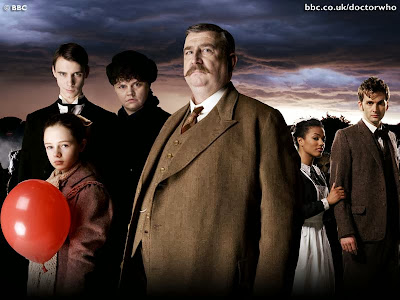Well. Yes. Thank goodness that’s over really. I mean there’s
stuff to like in there, don’t get me wrong, and it’s very very VERY epic, looks
amazing in HD and all that. AND it has Timothy freaking Dalton as Rassilon,
which is bloody brilliant, and Bernard Cribbins also being bloody brilliant,
but at the end of the day, it’s hard to say that was ‘good’.
 |
| It's flippin' Timothy Dalton! |
The Master is back, brought to life by some sort of
witchcraft it seems which beggars belief honestly what a load of rot. John
Simms however gives a great performance over the two parts, that I can’t fault,
but the things RTD writes for the Master are not particularly well thought out
or interesting. In particular his need to eat, the speed at which he devours
food and humans, and more so the entire plotline of turning everyone on Earth
into himself. That to me was just a gimmick. Ok, probably not a cheap one, but
a gimmick none the less. Then we have Barack Obama’s plan to bring about
economic prosperity which is written in as if it was aimed at 6 year olds.
 |
| John Simm (the Master) is up to some odd stuff.. |
We have RTD’s treatment of Donna, who ends up getting
married in the end as if that’s the most satisfying way to resolve her
character arc. After the brilliant use of Donna over series four, finale
excepted, this was really unsatisfying. Then we have the last fifteen minutes
where the Doctor, knowing the end is nigh, still has time to go and see
everyone he’s met during his tenth incarnation when you just want him to DIE.
Well, I did, it went on forever.
Sorry to all those into Doctor Who solely because of David
Tennant’s hair.
Then we have the Time Lords. And personally, despite the
awesomeness of Timothy FREAKING Dalton, I think they should have stayed locked
in the time war. I guess there wasn’t anything bigger to bring back and RTD
wanted a big finish for himself and David Tennant. And it is epic. I’ll give
him that. But sadly this episode, these episodes, are a reflection of the parts
of the era that I didn’t like – the overblown finale solved by touching a
button, or in this case, shooting a gun at a machine.
 |
| He doesn't want to go. Which is why, I guess, he takes so long to do it! |
The Master is just weird in this. Bouncing about in the air
like a jack-rabbit, eating a turkey in a few seconds, Rassilon has a bizarre
metal glove which zaps people a lot, we have the Naismith guy and his daughter
who are barely used and stupid typical RTD characters who merely serve a
purpose in the script. BUT it is in HD, and has an awesome sequence where the
Doctor pilots the space ship back to Earth and Star Wars memories are invoked
as Wilfred Mott shoots a laser cannon at incoming missiles.
And David Tennant. Look, my impression actually improved of
the tenth Doctor as he went along, only the first David Tennant series really
annoyed me, he was just too smug and a lot of that was to do with Rose. Oh by
the way, Bille Piper has clearly had work done on her lips, evident also in
series 4. Those lips just looking plain creepy now. I find it very hard to
reconcile that the love of the Doctor’s life is a 19 year old girl. I’m sorry,
I do and that’s RTD’s fault.
 |
| So long Bernard Cribbins, it's been an honour. |
Tennant works best with Donna, a wonderful balance between
the two lit up the show for a year, and he’s not bad with Bernard Cribbins
either, that was a wonderful piece of casting and who thought the ‘companion’
for the last Tennant adventure would be someone approaching 80 years old, and
male?
The RTD era is now over. If you take the series finales out
and this one, which is effectively the Daddy of all series finales, then I
think generally the episodes have been excellent. His casting has been good
too, David Tennant being the most popular Doctor ever, and Christopher
Eccleston, in my opinion, as perfect a casting job as could be dreamt of. I
really loved Eccleston as the Doctor, it was an inspired choice. Billie Piper
was a risk that turned out to be genius, and Catherine Tate was even better.
Freema Ageyman was less successful, she starts off well but the writing for
Martha unfortunately waned, and I think to be honest, some of the things they
asked her to do at the end of series 3 and when she returned in series four
were a bit beyond her range.
As a writer, opinion is divided on RTD. The man who wrote
the each series finale also contributed – ‘Rose’, ‘Midnight’, ‘Turn Left’, and
‘Utopia’ amongst other episodes. All brilliant in my books. He shaped the
seasons well, and he got better at it each year. Series arcs, character
development, all that stuff he was great at. Was there too strong an emphasis
on emotions? Probably. Was the Tennant-Piper pairing grating. Definitely. But
the guy brought the show back. He made it a hit. I forgive him his foibles. All
of them.
As for ‘The End of Time’, I wish I could give it a great
score. But it really is awful!
2/10


















































